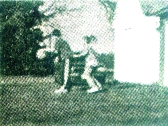题目内容
此题要求改正所给短文中的错误。文中共有10处语言错误,每句中最多有两处。每处错误仅涉及一个单词的增加、删除或修改。
增加:在缺词处加一个漏字符号(∧),并在其下面写出该加的词。
删除:把多余的词用斜线(﹨)划掉。
修改:在错的词下划一横线(__),并在该词下面写出修改后的词。
注意:
每处错误及其修改均仅限一词。2、只允许修改10处,多者(从第11处起)不计分。
I like riding my bike. Though it is not very new, but it is my best friend. I find very convenient to go anywhere with a bike. Riding gives me not only exercises but also pleasure. I use my bike almost in summer when the weather is warm and dry. It can be very pleasant in winter when it is cold and rain is pour down. It can also be very dangerous. Therefore, I am very carefully on my bike. In fact, accidents are not the only problem. Once I went to bookstore on my mother’s bike to buy some books and come out to find the bike missed. Now I have two strong locks.
1.but去掉。
2.在find和very中间加it.
3.将exercises改为exercise
4.将almost改为mostly.
5.将can改为can’t,或把pleasant改为unpleasant.
6.将pour改为pouring.
7.将careful改为carefully.
8.在to和bookstore中间加a.
9.将come改为came.
10.将missed改为missing.
【解析】
试题分析:我喜欢骑车,当然也很在乎我的自行车。
1.
2.
3.
4.almost的意思是: adv. 几乎; 将近; 差不多; 差一点儿就...; 快要;I almost fell. 我差一点儿就跌倒了。mostly 的意思是: adv 1)主要地; 多半地 如: The earth here is mostly clay. 这儿的土大部分是粘土。 Most of the Americans use their cars mostly for their job. 大多数美国人的汽车主要是用来上班的。 2)通常 如:The audience consisted mostly of women. 观众主要是妇女。 Our weather has been mostly warm. 我们这里的天气多半是暖和的。
5.’t,或把pleasant改为unpleasant.根据语意,在冬天又冷又下雨的天骑车,显然是不愉快的。
6.
7.
8.
9.
10.
考点:重点词汇的基本用法

 初中学业考试导与练系列答案
初中学业考试导与练系列答案
